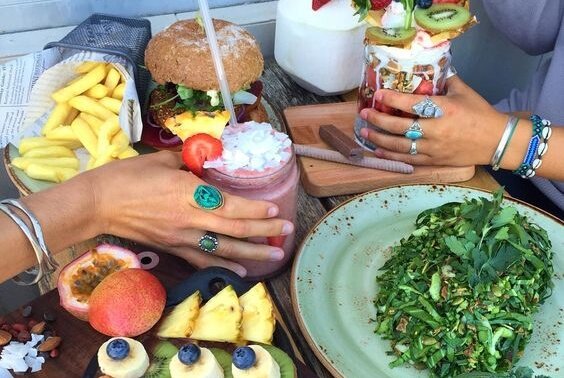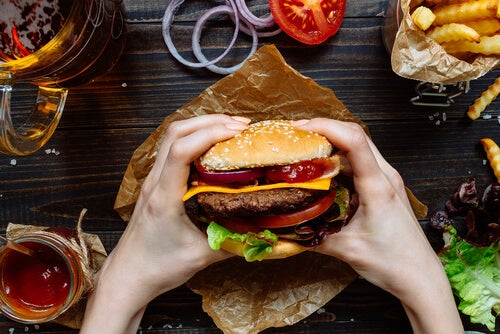Food and Emotions: An Interesting Combination

Have you ever heard the expression that you are what you eat? As a matter of fact, nothing could be more certain, yet also underestimated. You’ve surely read thousands of times that you should eat healthily. For instance, you’re told to avoid junk food and sugar, and you’re offered thousands of products on a daily basis promoting an ideal diet.
Yet, you’re rarely aware of what you eat or why you eat it. You only think about it when you want to control your weight or you’re sick. Indeed, for most of us, food is more a matter of taste than analysis. Therefore, you simply don’t stop to think that what you feel could be influenced by what you eat.

What does what you eat say about your emotions?
You feel inclined toward some foods and reject others, but you’re not aware of why. You also change your eating habits. For instance, sometimes you’re dying for ice cream and, on other occasions, you find the idea of something sweet rather off-putting. What mechanisms are operating in these cases?
Experts indicate that, in principle, there’s a direct relationship between the amount of energy that you perceive as necessary and your inclination to consume certain products. For example, your taste for coffee, black tea, or meat tends to be associated with your perception that you lack energy. On the other hand, your fondness for sugar or alcohol is related to the feeling that you have excess energy and you need to compensate for the anxiety that this generates in you.
The consumption of these foods, which apparently help you regulate energy, causes an alteration of the pH in your blood. This means it gets more acidic. That’s when digestive problems appear on the physical plane and, on the emotional plane, irritability, depression, anxiety, and fears increase.
It’s also been discovered that you look for sweet flavors when you experience feelings of abandonment or lack of affection. Indeed, it’s not uncommon to try and fill an existential void with chocolate.
Several studies have been conducted regarding the consumption of so-called ‘junk food’, which is characterized by being highly flavored, but containing low nutrients. The conclusions indicate that, if you’re inclined toward this type of diet, you unconsciously seek to remain in a state of indifference. You don’t want to think. You don’t want to feel. In fact, you want to go through life without stopping to contemplate the landscape. It acts as a kind of barrier to avoiding something that’s bothering you internally.

Eat to balance yourself emotionally
Food is a great help in achieving a balance between a healthy body and a healthy mind, which the ancient Greeks talked about so much. According to experts, the foods that best contribute to regulating emotions are cereals. These are rich in Vitamin B, which directly influences the nervous system. It’s been established that the frequent consumption of cereals reduces anxiety and promotes a good attitude toward life.
Some foods, when consumed to excess, increase the production of adrenaline. This leads to a lack of concentration and avoidance behaviors. In this group are stimulants like coffee, tea, alcohol, refined sugars, white flour, whole milk, and some fruits with powerful flavors such as pineapple, banana, avocado, mango, papaya, and coconut.
Other foods, when eaten in large quantities cause a lack of energy and difficulty in taking action. These are saturated fats, salty and dry cheeses, eggs, sausages, and salt.
The foods that should be consumed regularly to balance the emotions and maintain good health are nuts, fresh vegetables, vegetable proteins, whole grains, and pasta, as well as fish and shellfish. Furthermore, you should also try and eat calmly and, with any luck, in good company. That increases the nutritional power of any food.
Image courtesy of Juan Ramón Rodríguez Sosa.
Have you ever heard the expression that you are what you eat? As a matter of fact, nothing could be more certain, yet also underestimated. You’ve surely read thousands of times that you should eat healthily. For instance, you’re told to avoid junk food and sugar, and you’re offered thousands of products on a daily basis promoting an ideal diet.
Yet, you’re rarely aware of what you eat or why you eat it. You only think about it when you want to control your weight or you’re sick. Indeed, for most of us, food is more a matter of taste than analysis. Therefore, you simply don’t stop to think that what you feel could be influenced by what you eat.

What does what you eat say about your emotions?
You feel inclined toward some foods and reject others, but you’re not aware of why. You also change your eating habits. For instance, sometimes you’re dying for ice cream and, on other occasions, you find the idea of something sweet rather off-putting. What mechanisms are operating in these cases?
Experts indicate that, in principle, there’s a direct relationship between the amount of energy that you perceive as necessary and your inclination to consume certain products. For example, your taste for coffee, black tea, or meat tends to be associated with your perception that you lack energy. On the other hand, your fondness for sugar or alcohol is related to the feeling that you have excess energy and you need to compensate for the anxiety that this generates in you.
The consumption of these foods, which apparently help you regulate energy, causes an alteration of the pH in your blood. This means it gets more acidic. That’s when digestive problems appear on the physical plane and, on the emotional plane, irritability, depression, anxiety, and fears increase.
It’s also been discovered that you look for sweet flavors when you experience feelings of abandonment or lack of affection. Indeed, it’s not uncommon to try and fill an existential void with chocolate.
Several studies have been conducted regarding the consumption of so-called ‘junk food’, which is characterized by being highly flavored, but containing low nutrients. The conclusions indicate that, if you’re inclined toward this type of diet, you unconsciously seek to remain in a state of indifference. You don’t want to think. You don’t want to feel. In fact, you want to go through life without stopping to contemplate the landscape. It acts as a kind of barrier to avoiding something that’s bothering you internally.

Eat to balance yourself emotionally
Food is a great help in achieving a balance between a healthy body and a healthy mind, which the ancient Greeks talked about so much. According to experts, the foods that best contribute to regulating emotions are cereals. These are rich in Vitamin B, which directly influences the nervous system. It’s been established that the frequent consumption of cereals reduces anxiety and promotes a good attitude toward life.
Some foods, when consumed to excess, increase the production of adrenaline. This leads to a lack of concentration and avoidance behaviors. In this group are stimulants like coffee, tea, alcohol, refined sugars, white flour, whole milk, and some fruits with powerful flavors such as pineapple, banana, avocado, mango, papaya, and coconut.
Other foods, when eaten in large quantities cause a lack of energy and difficulty in taking action. These are saturated fats, salty and dry cheeses, eggs, sausages, and salt.
The foods that should be consumed regularly to balance the emotions and maintain good health are nuts, fresh vegetables, vegetable proteins, whole grains, and pasta, as well as fish and shellfish. Furthermore, you should also try and eat calmly and, with any luck, in good company. That increases the nutritional power of any food.
Image courtesy of Juan Ramón Rodríguez Sosa.
This text is provided for informational purposes only and does not replace consultation with a professional. If in doubt, consult your specialist.







